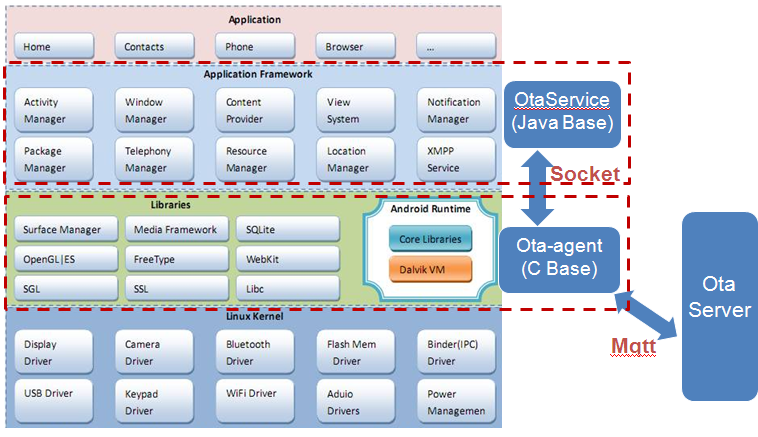WISE-PaaS/OTA Agent(Android)
From ESS-WIKI
Contents
Introduction
This document demonstrates how to support our ota-agent solution under your android system.This demonstration is android 4.3 based. If you encounter problems under your some-verson android system,please mailto me: jin.xin@advantech.com.cn
Architecture
The android ota solution is compose of two parts: the C-lanuage based Ota-agent and the Java-language based OtaService.
- Ota-agent achieves communiction with the ota-server, besides, it achieves the package download and unzip. But, the Ota-agent is C-language based and it can't invoke the Java-language based android OTA APIs, so the OtaService comes.
- OtaService is on the android framework layer, so it can invoke the android OTA APIs directly. The OtaService provides as a socket server. So the Ota-agent can invoke the android OTA APIs through the socket connnect providing by OTaService indirectly.
Android OtaService
we now support four commands, you can extent your commands.
private void startTestThread(final LocalSocket socket){
Thread t = new Thread(){
@Override
public void run(){
try{
InputStream is = socket.getInputStream();
InputStreamReader isr = new InputStreamReader(is);
while(true){//
char [] data = new char[128];
int readBytes = isr.read(data);
if(readBytes != -1){
String tempStr = new String(data, 0, readBytes);
Slog.i(TAG, "recv str: " + tempStr + " len is :" + readBytes);
String newstr = tempStr.trim();
Slog.i(TAG, "newstr: " + newstr);
String[] asplit = newstr.split("#");
Slog.i(TAG, "asplit[0]: " + asplit[0]);
switch(Advaction.getAdvaction(asplit[0])){
case systembackup:
Slog.i(TAG, "switch systembackup");
RecoverySystem.rebootSystemBackup(mContext);
break;
case wipedata:
Slog.i(TAG, "switch wipedata");
RecoverySystem.rebootWipeUserData(mContext);
break;
case wipecache:
Slog.i(TAG, "swtich wipecache");
RecoverySystem.rebootWipeCache(mContext);
break;
case install:
Slog.i(TAG, "switch install");
String file = asplit[1].trim();
Slog.i(TAG, "install file: " + file);
File recoveryFile = new File(file);
if(!recoveryFile.exists()){
Slog.i(TAG, "install, file not exist");
return;
}
RecoverySystem.installPackage(mContext, recoveryFile);
break;
default:
Slog.i(TAG, "error paramer");
break;
}
}
else
Slog.i(TAG, "recv error");
Slog.i(TAG, "finished");
return;
}
}catch (IOException e){
e.printStackTrace();
}
}
};
t.start();
}
Android OtaService test tools
To test the OtaService, I developed a OtaClient test tools:
void usage()
{
#define ALOGI printf
ALOGI(LOG_TAG "not support, usage: \n");
ALOGI(LOG_TAG "servertest [action string] [option]\n");
ALOGI(LOG_TAG "action string can be:\n");
ALOGI(LOG_TAG " systembackup -- mean system backup\n");
ALOGI(LOG_TAG " wipedata -- mean wipe data partition\n");
ALOGI(LOG_TAG " wipecache -- mean wipe cache partition\n");
ALOGI(LOG_TAG " install /cache/update.zip -- mean update system and /cache/update.zip is the option\n");
}
int main(const int argc, const char *argv[]) {
static int clientfd;
ALOGI(LOG_TAG "test recovery functions...\n");
if(argc <= 1 && argc > 3){
usage();
return -1;
}
else if(argc == 2){
if(strncmp(argv[1], "systembackup", strlen("systembackup")) && strncmp(argv[1], "wipedata", strlen("wipedata")) && strncmp(argv[1], "wipecache", strlen("wipecache"))){
usage();
return -1;
}
}
else if(argc == 3){
if(strncmp(argv[1], "install", strlen("install"))){
usage();
return -1;
}
}
else{
usage();
return -1;
}
clientfd = socket_local_client("ota_server", ANDROID_SOCKET_NAMESPACE_ABSTRACT,SOCK_STREAM);
if(clientfd < 0){
ALOGE(LOG_TAG "Failed to connect to local socket test_server: %s\n", strerror(errno));
exit(1);
}
ALOGI(LOG_TAG "test connect successful\n");
sleep(1);
if(argc == 2){
writex(clientfd, argv[1], strlen(argv[1]));
}
else if(argc == 3){
char astr[1024] = {0};
int len1 = strlen(argv[1]);
int len2 = strlen(argv[2]);
int len3 = strlen("#");
strncpy(astr, argv[1], len1);
strncpy(astr+len1, "#", len3);
strncpy(astr+len1+len3, argv[2], len2);
writex(clientfd, astr, strlen(astr));
}
else{
usage();
return -1;
}
return 0;
}
Android Ota-agent
The Android Ota-agent is same as the wise-pass ota-agent,The difference is that I modify the linux's Makefie to Android's Android.mk.
so although we have provided the binary file for android, you can rebuild the ota-agent under android system too.
